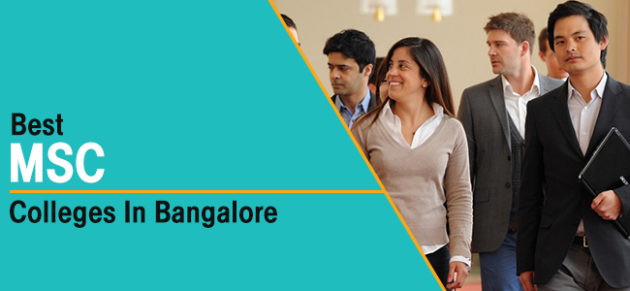Best M.Sc Colleges in Bangalore – Career, Scope, Job, Salary Details based on 2022 – 23 Rankings and Reviews
Updated on 17 March 2023

M.Sc. in Bangalore
So how does Wikipedia define science? Science is a systematic enterprise that builds and organizes knowledge in the form of testable explanations and predictions about the universe.
In simple terms, our lives are directly or indirectly a product of the scientific advancements made in various different branches. Science relies heavily on observation, thorough analytical studies and their systematic breakdowns. Science is not just a study of different natural, physical and biological components that make up the world we live but it’s also the method of study in itself.
The scientific approach towards analysis has been incorporated in various streams such as finance and business. Let’s not go off topic, though, as we will be focusing on how one can make a career in the diverse field of Science which is broken down into different parts such as Formal Sciences, Physical Sciences, Life Science, Social Sciences, Applied Sciences and Interdisciplinary Sciences.
If you are reading this, I’m sure you already know what science is all about and are looking to enhance your existing knowledge regarding its immense realm and different disciplines.
Before we move forward to the course details, let’s see what M.Sc. has to offer…
What is M.Sc.?
Master of Science (M.Sc.) is considered to be a more research-oriented course that delves deeper into the specifics of any related branch of science. We have listed the different branches that are offered as specializations in M.Sc :
- MSc. in Physics
- MSc. in Chemistry
- MSc. in Zoology
- MSc. in Botany
- MSc. in Agriculture
- MSc. in Mathematics
- MSc. in Computer Science
- MSc. in Information Technology
- MSc. in Clinical Psychology
- MSc. in Nursing
- MSc. in Electronics
- MSc. in Biotechnology
- MSc. in Microbiology
- MSc. in Forensic Science
- MSc. in Biological Sciences
- MSc. in Food and Nutrition
- MSc. in Environmental Science
- MSc. in Economics
- MSc. in Geology
- MSc. in Analytical Chemistry
- MSc. in Anthropology
- MSc. in Applied Mathematics
- MSc. in Biochemistry
- MSc. in Bioinformatics
- MSc. in Geography
M.Sc. takes a more advanced stance on all the principles of the aforementioned streams and encourages the student to conduct their own research work in order to formulate a thesis paper.
M.Sc. is an up-to-date programme that takes into account all the latest developments in the branch of your choice. This is in addition to strengthening the core foundation of a student regarding the tried-and-tested scientific doctrines.
M.Sc. Course Duration
Master of Science (M.Sc.) is a 2-year post graduate programme that is split into 4 semesters. The course can be pursued on a full-time campus basis as well as through any of the distance education means provided by many science colleges.
Each year contains 2 semesters with each term having a minimum of 6 or more subjects which are all avant-grade in comparison to the ones offered during your undergraduate studies.
M.Sc. Eligibility Criteria
- Should have a Bachelor’s Degree in any of the science-related streams from a recognized university. The M.Sc. course is tailor-made for B.Sc. graduates.
- The cut-off differs from institute to institute; however, most colleges require candidates to score at least 55% in graduation exam finals.
- Clearing any of the accepted entrance exams is mandatory in order to get into the top M.Sc. colleges in the country.
- Entrance exams are conducted at the state, national, university and institute levels.
M.Sc. Admission Process
- Determine what kind, of course, you are willing to pursue – Full-time or Distance.
- Once you have made your decision, zero down on the colleges that fit your criteria. The parameters should include location, finances, amenities and the college’s scope for providing further opportunities.
- Collect the admission forms and submit them as soon as the admission phase is active. The forms can be collected online or from the college campus. Notifications regarding the admission period can be found on the college website.
- Next step would be to inquire about the accepted entrance test and to enroll yourself up for the same.
- Colleges put out a merit list and if you feature in the said list, you would need to pay a certain amount of fees to lockdown the seat and confirm your admission.
- Some colleges may even have an interview round after clearing the entrance exam.
The process sounds complicated, right? Relax, that’s where we come into the picture. Reach out to us at 08061160468 and we will help you get through the procedure without any trouble.
M.Sc. Entrance Exams in Bangalore
-
- Indian Institute of Technology Joint Admission Test for M.Sc. (IIT JAM M.Sc.)
- National Entrance Screening Test (NEST)
- Jain Entrance Test (JET)
- GITAM Science Admission Test
- BITSAT
- CUSAT CAT
- Christ University M.Sc. Entrance Test
M.Sc. Course Syllabus Bangalore
The coursework includes theory/classroom lectures, lab practicals and seminars. The assessment is done through written examinations conducted at the end of each semester as well as Viva Voice and projects. Some institutes would need you to prepare and submit a thesis paper/dissertation in the final semester.
The subjects vary depending on the branch and relate to the specialization. We have listed down the syllabuses of three of the most popular branches to give you a better idea.
M.Sc. in Chemistry
| Semester I |
| Inorganic Chemistry
Transition and Non-Transition Metal Chemistry Quantum Chemistry Principles of Organic Chemistry Group Theory and Spectroscopy |
| Semester II |
| Organic Reactions Mechanisms
Inorganic Reaction Mechanism and Organometallics Chemical Dynamics and Electrochemistry Applications of Spectroscopy Organic Chemistry (Lab) |
| Semester III |
| Concepts in Organic Synthesis
Principles of Bioinorganic Chemistry Classical and Statistical Thermodynamics Modern Techniques and Scope of Chemical Biology Physical Chemistry (Lab) Seminar |
| Semester IV |
| Electives I and II
Computer in Chemistry Project List of Electives
|
M.Sc. in Physics
| Semester I |
| Electronics I
Mathematical Methods I Atomic Spectroscopy Classical Mechanics Nuclear Physics I Quantum Mechanics I Electronics I Classical Electrodynamics I |
| Semester II |
| Electronics II
Mathematical Methods II Relatively and Cosmology Advanced Optics Nuclear Physics II Quantum Mechanics II Electronics II Classical Electrodynamics II |
| Semester III |
| Computer Applications in Physics I
Advanced Quantum Mechanics I Statistical Mechanics I Group Theory Special Subjects |
| Semester IV |
| Pharmaceutical Microbiology
Recombinant DNA Technology Bioinformatics, Proteomics and Microbial Genomics Fermentation Technology |
M.Sc. in Mathematics
| Semester I |
| Topology I
Algebra I Ordinary Differential Equations Real Analysis Discrete Mathematics Practical (Scilab and Maxima Practicals and Problem Working, Discrete Mathematics Practicals Using Maxima or Such Other Software and Problem Working) Biography of Eminent Mathematicians and History of Mathematics |
| Semester II |
| Topology II
Algebra II Functional Analysis Partial Differential Equations Complex Analysis Practical (Partial Differential Equations Practicals and Problem Working, Numerical Analysis Practicals and Problem Working) Mathematical Modeling and Numerical Analysis I |
| Semester III |
| Numerical Analysis II
Fluid Mechanics Differential Geometry Mathematical Methods Practical (Numerical Analysis Practicals and Problem Solving, Mathematical Methods Practicals with Free and Open Source Software Tool and Software Working) Electives
|
| Semester IV |
Electives (Any 3)
Project Measure and Integration |
M.Sc. Average Course Fees
The average fee for M.Sc. programmes offered by colleges in Bangalore ranges between Rs. 40,000 – 80,000 per annum.
The minimum fee is around Rs. 17,000 – 25,000 while the maximum it can get is between Rs. 90,000 – 2 lakhs in top private institutions.
M.Sc. Scope and Job Opportunities
You may be wondering, what do you stand to gain by dedicating two more years after a 3-year undergraduate course? Top companies and recruiters are looking for additional skills and bulked up resumes these days, and having an M.Sc. degree will help you get an edge over competitors who are battling for similar jobs.
M.Sc. graduates can assume any of the following job roles:
- Scientist
- Scientific-project coordinator
- Scientific Reviewer
- Scientific Laboratory Technician
- Data Scientist
- Medical Coder
- Food Technologist
- Nutritionist
- Oncologist/Nurse (M.Sc. Nursing)
- System Analyst (M.Sc. Mathematics)
- Technical Writer
- Software Developer (CS, IT)
- Product/Process Development Scientist
- Education and Training officer
- Lecturer
- Assistant Professor
- Researcher
The multifarious nature of science is the biggest reason why M.Sc. is one of the most popular PG courses. Physics, Mathematics, Biotechnology, computer science and other related fields currently need high-level professionals to meet the demands in education and research avenues.
M.Sc. graduates can find jobs in healthcare, information technology, computer science, edutech, aerospace and various other sectors.
Science needs motivated scientists to further explore and unearth new developments for the betterment of mankind. M.Sc. graduates can pursue a Ph.D. and go onto make breakthroughs in the exciting fields of science and technology. All the famous modern-day research scientists have done an M.Sc. which amplified their understanding and application.
M.Sc. Payscale and Salary
The average package of M.Sc. graduates is around Rs. 7-9 lakhs per annum. Data Scientists can make as high as Rs. 22 lakhs per annum while senior software engineers pocket a handsome salary of around Rs. 18 lakhs per year.
M.Sc. graduates in the IT sector can make anywhere around Rs. 10 lakhs to 32 lakhs per annum. The salaries depend on factors such as experience, technical expertise, company and also individual performance and consistency. Adding an M.Sc. degree to the essential ethos of work only increases your overall salary in the long run.
List Of Best MSc Colleges in Bangalore
Here is a list of the best MSc colleges in Bangalore, don’t worry there is a details part as well where you can get the details of these colleges.
|
|
|
|
|
|
|
|
|
|
and as promised below are the details of the above mentioned best MSc colleges in Bangalore.
-
Indian Institute of Science
Address: CV Raman Rd, Bengaluru, Karnataka- 560012
Website: www.iisc.ac.in
Email: webadmin@iisc.ac.in
-
International Institute of Information Technology
Address: 26/C, Hosur Rd, Electronics City Phase 1, Electronic City, Bengaluru, Karnataka- 560100
Website: www.iiitb.ac.in
Email: registrar@iiitb.ac.in
-
Jain University
Address: #44/4, District Fund Road Jayanagar, 9th Block Behind Big Bazaar, Bengaluru, Karnataka- 560069
Website: www.jainuniversity.ac.in
Email: www.jainuniversity.ac.in
-
Jyoti Nivas College Autonomous
Address: Jyoti Nivas College Autonomous, Hosur Road, Bangalore – 560095
Website: www.jyotinivas.org
Email: info@jyotinivas.org
-
Christ (Deemed to be University)
Address: Hosur Main Road, Bhavani Nagar, Suddagunte Palya, Bengaluru, Karnataka- 560029
Website: www.christuniversity.in
Email: mail@christuniversity.in
-
Mount Carmel College
Address: Fatima Block, 58, Palace Rd, Abshot Layout, Vasanth Nagar, Bengaluru, Karnataka- 560052
Website: www.mccblr.edu.in
Email: mounts@bgl.vsnl.net.in
-
MS Ramaiah College of Arts Science & Commerce
Address: 7th Main Road, MSRIT, M S R Nagar, Mathikere, Bengaluru, Karnataka- 560054
Website: www.msrcasc.edu.in
Email: principal.msrcasc@gmail.com
-
Reva Institute of Science
Address: Vishveshvaraiah Nagar, Ganga Nagar, Bengaluru, Karnataka- 560024
Website: www.revainstitution.org
Email: enquiries@revainstitution.org
-
Joseph’s College
Address: 36, Langford Road, Langford Gardens, Bengaluru, Karnataka- 560027
Website: www.sjc.ac.in
Email: desk@sjc.ac.in
-
The National Degree College
Address: 188, 189, 36th B Cross Rd, 7th Block, Jayanagar, Bengaluru, Karnataka- 560070
Website: www.ncjayanagar.com
Email: ncjblore@yahoo.com



